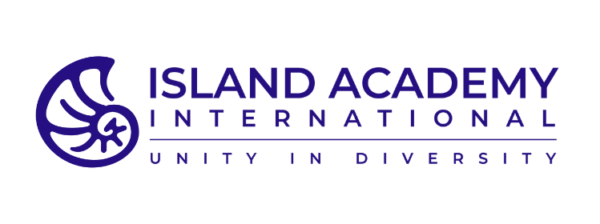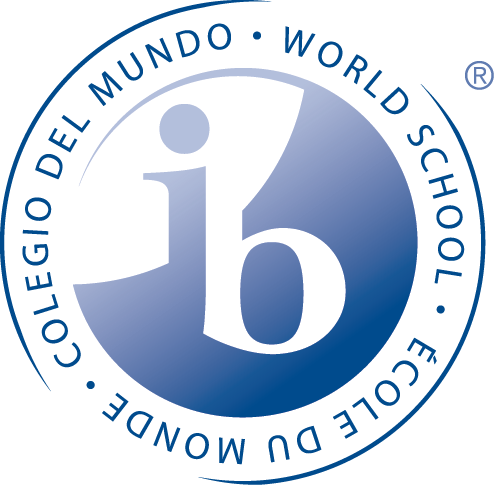
In 2009, Island Academy joined the select group of schools around the world offering the IBDP. The IBDP is a two-year college/university programme primarily aimed at 16 to 19-year olds. The programme provides an internationally accepted qualification for entry into higher education and is recognized by many universities worldwide.. For a concise overview of the IBDP, please click here.
Students may choose to do the full IB DP(as described below), or opt for the Island Academy High School Diploma with IB certificates.
As Antigua’s sole international school we strive to appeal to a diverse international and expatriate community as well as to meet the needs of the local population. We aim to produce young adults with not only an education that allows them to study at International Universities but also with the values of tolerance, curiosity, and respect for others.
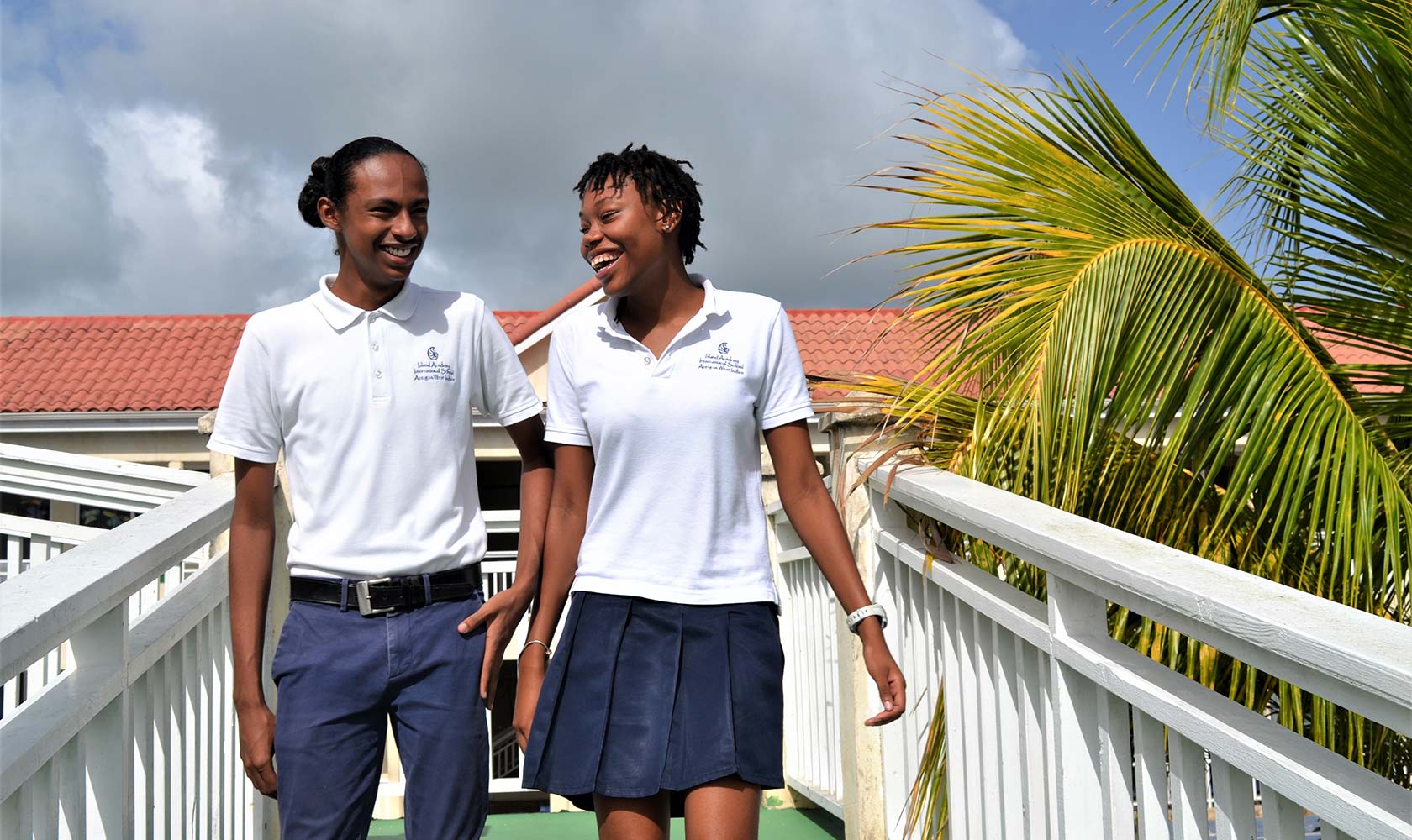
The IBDP must be completed over a two-year period. For students to gain the coveted 24 points and above to achieve the full diploma they need to select three Higher Level (HL) courses and three Standard Level (SL) courses. Students must also complete the Extended Essay (EE), Theory of Knowledge (ToK) requirements and Creativity, Action and Service (CAS) components.
Many students earning the IB Diploma are awarded advanced college credit at prestigious universities around the world. Many highly competitive colleges and universities recognize the IBDP for admissions and/or advanced standing.
Students must take a total of six (6) subjects from Groups 1 -6. The IB Diploma candidate is required to select one subject from each of the following areas.
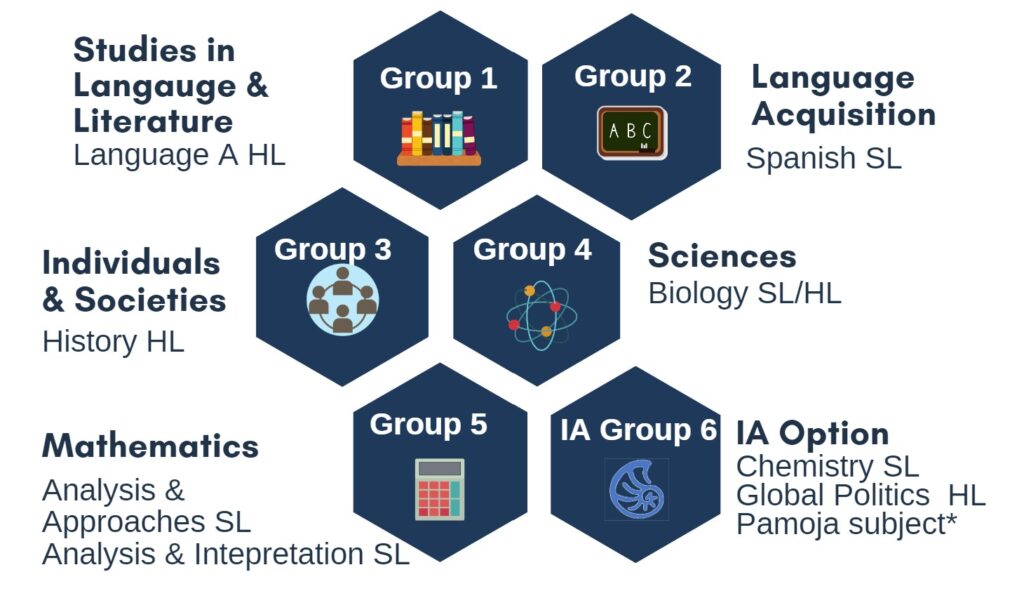
*Pamoja subject: Students may choose an online course at Pamoja Education which provides online learning for the IB programme. Courses include but are not limited to Business Management (HL & SL), Economics (HL & SL), French Ab Initio and Psychology (HL & SL). .
At least three, and not more than four, of the six subjects are taken at the Higher Level (HL-240 hours) and the others at a Standard Level (SL-150 hours). Each examined subject is graded on a scale of 1 (minimum) to 7 (maximum). The award of the IBDP requires a minimum total of 24 points.
Apart from successfully completing prescribed coursework and examination from each of the above groups, to be eligible for the award of the IB Diploma at the conclusion of the two-year program, all candidates must also:
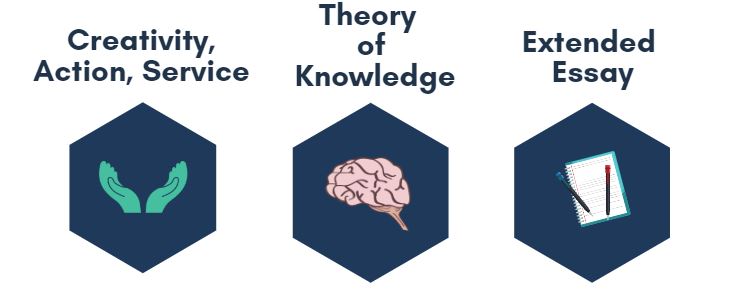
The full IBDP may not be appropriate for all students. Students can follow the same curriculum as his/her classmates, with the reduced ‘core trio’ of ToK, Extended Essay, and CAS requirements, while opting for IB Certificates in specific courses of choice.
Taking this route will mean the student can still go to university, but they will not graduate with the full IBDP.
English A (HL): This course guides students in exploring how time, place, intertextuality, and the relationship between author and reader influences our interpretation of a text. Students examine how writers write by analyzing an author’s broader choices as well as textual features such as form, structure, and style. The course links works of literature to wider global issues and allows students the opportunity to explore works of fiction and nonfiction, graphic novels, poetry, and drama. By the end of the IBDP, students engage in effective personal engagement with the texts and have a clear understanding of the complex relationship between author and reader.
See course outline here.
Biology (HL): As one of the three natural sciences in the IB Diploma Programme, biology is primarily concerned with the study of life and living systems. Through the study of DP biology, students are empowered to make sense of living systems through unifying themes. By providing opportunities for students to explore conceptual frameworks, they are better able to develop understanding and awareness of the living world around them. By exploring the subject, they develop understandings, skills and techniques which can be applied across their studies and beyond..
See course outline here.
Mathematics – Application & Interpretation (SL): The DP Mathematics applications and interpretation course recognize the increasing role that mathematics and technology play in a diverse range of fields in a data-rich world. As such, it emphasizes the meaning of mathematics in context by focusing on topics that are often used as applications or in mathematical modelling. To give this understanding a firm base, this course includes topics that are traditionally part of a pre-university mathematics course such as calculus and statistics. Students are encouraged to solve real-world problems, construct and communicate this mathematically and interpret the conclusions or generalizations. Students should expect to develop strong technology skills, and will be intellectually equipped to appreciate the links between the theoretical and the practical concepts in mathematics.
See course outline here.
Mathematics – Analysis & Approaches (SL): The IB DP Mathematics: analysis and approaches course recognizes the need for analytical expertise in a world where innovation is increasingly dependent on a deep understanding of mathematics. The focus is on developing important mathematical concepts in a comprehensible, coherent and rigorous way, achieved by a carefully balanced approach. Students are encouraged to apply their mathematical knowledge to solve abstract problems as well as those set in a variety of meaningful contexts. Students should expect to develop insight into mathematical form and structure, and should be intellectually equipped to appreciate the links between concepts in different topic areas.
See course outline here.
History (HL): The DP history course is a world history course based on a comparative and multi-perspective approach to history. It involves the study of a variety of types of history, including political, economic, social and cultural, and provides a balance of structure and flexibility. The course emphasizes the importance of encouraging students to think historically and to develop historical skills as well as gaining factual knowledge. It puts a premium on developing the skills of critical thinking, and on developing an understanding of multiple interpretations of history. In this way, the course involves a challenging and demanding critical exploration of the past.
See course outline here.
Spanish Ab Initio: The IB Spanish Ab Initio programme is meant for students with little or no knowledge of the Spanish language. Students develop the ability to communicate in the target language through the study of language, themes and texts. In doing so, they also develop conceptual understandings of how language works. Communication is evidenced through receptive, productive and interactive skills across a range of contexts and purposes that are appropriate to the level of the course. The language Ab. Initio syllabus is organized into five prescribed themes: identities, experiences, human ingenuity, social organization and sharing the planet.
See course outline here.
Spanish B (SL): The Spanish Standard Level (SL) course is designed for students who have some previous experience with the language. Students are exposed to a variety of authentic text types in relation to the prescribed themes and related course content. This course prepares students to describe situations, narrate events, make comparisons, explain problems, and state and support their personal opinions on a variety of topics relating to course content. There are five prescribed themes: identities, experiences, human ingenuity, social organization and sharing the planet which the students engage though written, audio, visual and audio-visual texts.
See course outline here.
Global Politics (HL): This course explores fundamental political concepts such as power, equality, sustainability, and peace in a range of contexts and using a variety of perspectives. Students engage with specific case studies, as well as analyzing particular theoretical approaches. This course encourages students to develop an understanding of the local, national, international, and global dimensions of political activity, as well as allowing them the opportunity to explore political issues which impact their own communities.
See course outline here.
Theory of Knowledge (ToK): The theory of knowledge (TOK) course plays a special role in the DP by providing an opportunity for students to reflect on the nature, scope and limitations of knowledge and the process of knowing. In this way, the main focus of TOK is not on students acquiring new knowledge but on helping students to reflect on, and put into perspective, what they already know. TOK underpins and helps to unite the subjects that students encounter in the rest of their DP studies. It engages students in explicit reflection on how knowledge is arrived at in different disciplines and areas of knowledge, on what these areas have in common and the differences between them.
See course outline here.
Extended Essay The extended essay is a compulsory, externally assessed piece of independent research into a topic chosen by the student and presented as a formal piece of academic writing. The extended essay is intended to promote high-level research and writing skills, intellectual discovery and creativity while engaging students in personal research. This leads to a major piece of formally presented, structured writing of up to 4,000 words in which ideas and findings are communicated in a reasoned, coherent and appropriate manner. Students are guided through the process of research and writing by an assigned supervisor. Extended essay topics may be chosen from a list of approved DP subjects—normally one of the student’s six chosen subjects for the IB diploma.
For a better understanding of the extended essay, please click here.
CAS (creativity, action, service)
Creativity, activity, service (CAS) is at the heart of the DP. CAS requires that students actively learn from the experience of doing real tasks beyond the classroom. It is organized around the three strands of creativity, activity and service defined as follows.
Creativity—exploring and extending ideas leading to an original or interpretive product or performance.
Activity—physical exertion contributing to a healthy lifestyle.
Service—collaborative and reciprocal engagement with the community in response to an authentic need.
For more details on the CAS component, please click here.
Again, it should be stressed that all students in the final two years at Island Academy follow the IB curriculum, no matter which diploma track they choose. Here are some typical reflections on the value of an IB education:
“…if your child is considering the IB, you can rest assured it will be a broad, demanding course with exam results at least equal to A-levels and recognized by universities.” –Caitlin Davies, writing in The Independent,
“The attraction of the baccalaureate is that the diversity keeps students interested and makes them more rounded and capable individuals.”–From The Times (London)
“Universities such as the London School of Economics and Imperial College, London said IB diploma students had a distinct advantage” –From The Sunday Times (London)
“[IB] pupils tended to be far better prepared for higher study than the average school leaver.” -From The Sunday Times (Scotland, UK)
